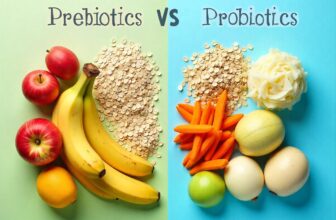
Is your gut trying to tell you something? In today’s fast-paced world, where processed foods and stress dominate our lives, maintaining optimal gut health has become more challenging—and more crucial—than ever. A staggering 70% of your immune system resides in your gut, making it the cornerstone of your overall health and wellbeing. 🦠
Yet, many of us struggle with digestive issues, from mild bloating to more serious conditions, often unaware that the right supplements could be game-changers in our gut health journey. While a balanced diet is fundamental, specific supplements can provide that extra boost your digestive system needs to function at its best. ✨
In this comprehensive guide, we’ll explore the most effective gut-supporting supplements that science backs, from probiotics that replenish your beneficial bacteria to enzymes that optimize nutrient absorption. Let’s dive into everything you need to know about transforming your gut health naturally.
Understanding Gut Health Fundamentals
Signs of Poor Gut Health
Common indicators that your gut health needs attention include:
- Frequent bloating and gas
- Irregular bowel movements
- Unexplained fatigue
- Food sensitivities
- Skin issues like acne or eczema
- Mood fluctuations
The Gut-Brain Connection
The gut and brain communicate through the vagus nerve and chemical messengers, creating a powerful two-way relationship. This connection explains why digestive issues often correlate with anxiety or stress, and why gut health directly influences mental well-being.
Role of Microbiome Balance
A healthy gut contains trillions of microorganisms working in harmony. This microbiome:
- Helps break down food
- Produces essential nutrients
- Protects against harmful bacteria
- Regulates metabolism
- Influences overall health
Impact on Immune System
Your gut houses approximately 70% of your immune system cells. A balanced gut microbiome:
- Strengthens immune response
- Reduces inflammation
- Helps identify harmful pathogens
- Maintains protective barrier function
- Supports overall immune regulation
The state of your gut health affects virtually every aspect of your well-being. While diet and lifestyle play crucial roles, supplements can provide additional support for maintaining optimal gut function. Let’s explore how probiotic supplements can help restore and maintain your gut health.
Essential Probiotic Supplements
Live Bacterial Strains Explained
Probiotic supplements contain specific living microorganisms that support your gut microbiome. The most effective probiotic supplements feature multiple strains, measured in Colony Forming Units (CFUs), typically ranging from 1 to 100 billion CFUs per serving. Key strains are categorized into two main families: Lactobacillus and Bifidobacterium.
Benefits of Lactobacillus Species
Lactobacillus strains are powerhouse probiotics that offer numerous benefits for gut health:
- L. acidophilus helps break down lactose and supports nutrient absorption
- L. rhamnosus strengthens the gut barrier and boosts immune function
- L. plantarum reduces bloating and helps manage IBS symptoms
- L. casei improves digestion and helps fight harmful bacteria
Bifidobacterium Benefits
Bifidobacterium strains work synergistically with Lactobacillus to enhance gut health:
- B. longum supports regular bowel movements and reduces inflammation
- B. bifidum enhances immune system function and improves nutrient absorption
- B. lactis helps break down body waste and supports healthy digestion
- B. breve protects against harmful bacteria and supports metabolic health
When selecting a probiotic supplement, look for products containing multiple strains from both families, with a CFU count appropriate for your needs. High-quality supplements will also include protective technologies to ensure the bacteria reach your gut alive. Now, let’s explore how prebiotic supplements can enhance the effectiveness of these beneficial bacteria.
Prebiotic Power Players
Inulin and FOS Benefits
Inulin and Fructooligosaccharides (FOS) are powerful prebiotic fibers that serve as fuel for beneficial gut bacteria. These natural compounds:
- Support the growth of Bifidobacteria and Lactobacilli
- Help reduce harmful bacteria populations
- Enhance calcium absorption
- Improve bowel regularity
Resistant Starch Sources
Resistant starch acts as a premium prebiotic source, found naturally in:
- Green bananas and plantains
- Cooled rice and potatoes
- Raw oats and legumes
- Modified corn starch supplements
Optimal Dosage Guidelines
For optimal gut health benefits, follow these dosage recommendations:
- Start with 2-3g daily of inulin or FOS
- Gradually increase to 5-10g per day
- For resistant starch, aim for 15-30g daily
- Always begin slowly to minimize digestive discomfort
Timing for Maximum Effect
Take prebiotics strategically throughout the day:
- Consume with meals to reduce potential bloating
- Space doses between probiotic supplements
- Take resistant starch supplements before bed for optimal fermentation
- Maintain consistent daily timing for best results
With these prebiotic supplements working to nourish your beneficial gut bacteria, let’s explore how digestive enzymes can further enhance your digestive health.
Digestive Enzyme Supplements
Types of Digestive Enzymes
Your body relies on specific enzymes to break down different nutrients:
- Proteases – break down proteins into amino acids
- Lipases – process fats into fatty acids
- Amylases – convert complex carbohydrates into simple sugars
- Lactase – helps digest dairy products
- Cellulase – breaks down fiber
When to Take Them
The timing of enzyme supplementation is crucial for maximum effectiveness:
- Take immediately before meals
- For larger meals, consider taking an additional dose during the meal
- Start with a lower dose and gradually increase as needed
- Consistency is key for optimal results
Choosing Quality Products
When selecting digestive enzyme supplements, consider these essential factors:
- Look for products with a broad spectrum of enzymes
- Check for third-party testing certification
- Avoid supplements with unnecessary fillers or additives
- Consider enteric-coated options for better absorption
- Verify the potency measurements (DU, HUT, or FIP units)
High-quality digestive enzyme supplements can provide significant relief for those experiencing bloating, gas, or nutrient malabsorption. They work by supporting your body’s natural digestive processes, particularly when your own enzyme production may be compromised. While many people produce sufficient digestive enzymes naturally, factors like age, stress, and certain health conditions can impact enzyme levels.
Now that you understand the role of digestive enzymes, let’s explore other beneficial supplements that can further support your gut health journey.
Additional Gut-Supporting Supplements
L-Glutamine Benefits
L-glutamine is a crucial amino acid that acts as primary fuel for intestinal cells. It helps maintain the integrity of the gut barrier and supports immune function within the digestive system. Regular supplementation can help reduce inflammation and repair damaged intestinal tissue.
Collagen for Gut Lining
This protein powerhouse strengthens the protective gut barrier by:
- Rebuilding damaged intestinal walls
- Reducing inflammation
- Supporting connective tissue formation
- Improving nutrient absorption
Fish Oil’s Gut Impact
Omega-3 fatty acids in fish oil reduce gut inflammation and support a healthy microbiome balance. Regular consumption helps maintain intestinal barrier function and promotes beneficial bacteria growth.
Zinc and Gut Health
Zinc plays a vital role in:
- Maintaining gut barrier integrity
- Supporting immune function
- Aiding in nutrient absorption
- Promoting healthy cell turnover
Herbal Supplements
Several herbs provide significant gut health benefits:
- Slippery Elm: Soothes irritated digestive tract
- Marshmallow Root: Forms protective layer on gut lining
- Ginger: Reduces inflammation and aids digestion
- Turmeric: Powerful anti-inflammatory properties
With these supporting supplements working alongside probiotics and digestive enzymes, you’re well-equipped to maintain optimal gut health. Now, let’s explore how to maximize the effectiveness of these supplements through proper timing and combination strategies.
Maximizing Supplement Effectiveness
Proper Storage Methods
Store your gut health supplements properly to maintain their potency. Keep probiotics and enzymes in a cool, dry place—ideally between 59-77°F (15-25°C). Refrigeration is often recommended for live bacterial strains. Always keep supplements in their original containers and tightly sealed to protect from moisture and light exposure.
Timing and Combinations
Strategic timing maximizes supplement benefits:
- Take probiotics on an empty stomach, 30 minutes before meals or 2 hours after
- Consume digestive enzymes right before or during meals
- Space prebiotic supplements throughout the day to avoid bloating
- Take gut-supporting supplements like L-glutamine between meals
Potential Interactions
Be mindful of supplement interactions with:
- Medications (especially antibiotics)
- Other supplements
- Certain foods and beverages
Avoid taking probiotics within 2 hours of antibiotics to prevent neutralization. Some minerals can compete for absorption, so space them apart. Digestive enzymes may interact with blood-thinning medications or diabetes treatments.
Remember that maintaining consistent timing and proper storage significantly impacts supplement effectiveness. Watch for signs of sensitivity or adverse reactions when combining multiple supplements. For best results, start with one supplement at a time and gradually introduce others while monitoring your body’s response.
Now that you understand how to optimize your supplement routine, you can make the most of your gut health investments and achieve better results from your chosen supplements.
Taking care of your gut health doesn’t have to be complicated. With the right combination of probiotics, prebiotics, digestive enzymes, and targeted supplements, you can create a powerful foundation for optimal digestive wellness. Remember to focus on high-quality supplements and maintain consistency in your routine for the best results.
Start small by incorporating one supplement at a time, paying attention to how your body responds. Consult with a healthcare provider to create a personalized gut health plan that aligns with your specific needs. Your gut health journey is an investment in your overall well-being – take that first step today.






